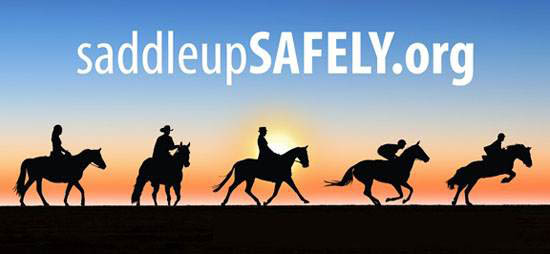Saddle Up Safely passes three-year mark
Saddle Up Safely passes three-year mark

Saddle Up Safely, a unique collaboration of University of Kentucky entities as well as equine industry and Lexington community partners, celebrated its third year this past October with a day at Keeneland and a silent auction fundraiser for the program.
UK HealthCare partnered with UK colleges of Agriculture and Public Health to launch the five-year educational campaign to raise awareness about horseback riding and horse handling safety. Nearly 50 community partners have joined in to help spread the word and collectively help make a great sport safer.
The statistics underscore the need. According to the National Electronic Injury Surveillance System's 2007 estimates, millions of people ride horses each year, generating approximately 79,000 emergency room visits, with more than 13 percent of those admitted to the hospital. While motorcycle riders experience a serious injury every 7,000 hours of riding, horseback riders experience one every 350 hours, according to the U.S. Centers for Disease Control and Prevention. It is estimated that one in five equestrians will be seriously injured during their riding careers. And novice riders, especially children and young adults, are eight times more likely to suffer a serious injury than professional equestrians.
According to Bill Gombeski, director of strategic marketing at UK HealthCare and Saddle Up Safely lead, the campaign set out to counter some of these statistics through education and awareness.
“At UK HealthCare, we see hundreds of patients with injuries caused from riding or handling horses, and about 75 each year are so severe that they are admitted to our hospital trauma service,” Gombeski said. “We also know from scientific studies and our own research that about two-thirds of all injuries are preventable.”
The campaign features several tools to inform and educate. In its first three years, Saddle Up Safely has produced six booklets with safety information on topics including horseback riding safety, diseases that can be spread from horses to humans, horse-related injuries, safety while in the pasture, barn safety and a children’s-focused book about potential dangers on horse farms that was developed in conjunction with Equine Guelph at the University of Guelph in Ontario, Canada.
An interactive website was developed at http://www.saddleupsafely.org, and information is updated as the campaign progresses. Additionally, an online safety quiz was launched, and Fernanda Camargo, extension horse specialist in the College of Agriculture, created a horse rider safety blog.
“To date, there have been more than 85 blog posts written, many with the help of other experts in the equine industry. The blog has been accessed over 73,000 times, which tells me that riders and people with horses want to be informed about safe horse handling practices,” Camargo said.
In Case of Emergency cards were also developed to enable riders to have pertinent personal and health information available in a pocket-sized format in case of an accident. Cards applicable to both rider and horse were created and are available to riders.
Saddle Up Safely is also part of an educational exhibit geared toward children that opened at the Kentucky Horse Park in February. Occupying a stall in a former draft horse barn, the Saddle Up Safely exhibit educates visitors about horse safety, correct riding apparel and proper tack. It also provides access to its stable of educational materials.
Collaboration has been a big part of the program, and in the past three years, Saddle Up Safely participated in the UK display at the 2010 Alltech FEI World Equestrian Games, formed an auxiliary of passionate volunteers who help spread the message of safety, set up a national e-advisory group, began a research study on horseback riding injuries and enlisted the help of key equine and community partners as part of its campaign. A list of key partners involved in this effort can be found at http://ukhealthcare.uky.edu/sponsors.aspx.
During the past three years, more than 100,000 safety booklets have been distributed, the website has had more than 22,000 visitors per month, and more than 350 people have posted safety tips of their own.
Ag Equine Programs

